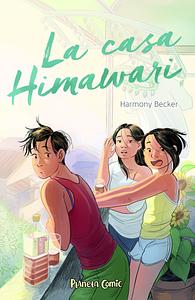You need to sign in or sign up before continuing.
Take a photo of a barcode or cover
I made this last as long as I could because I wanted to live in Himawari House for the rest of my life. I need 10000+ more pages, plz. What a *feeling* Becker creates in these four walls/on this giant island/in this potential life. I loved the illustrations (the blushing! the *kill me* frames, the sweat/anxiety and how it was portrayed, the gentle moments, the FOOD!), I loved the insight into each main character's family life before the house (honestly, I feel like readers could benefit from a bit more backstory for Nao, Tina, and Hyejung, but...that's probably more of my desire to just get more out of this story!) and I loved Becker's approach to characters with accents.
What a beautiful story. Loved it. Hell yeah.
What a beautiful story. Loved it. Hell yeah.
emotional
funny
hopeful
informative
inspiring
lighthearted
reflective
relaxing
sad
medium-paced
Plot or Character Driven:
Character
Strong character development:
Complicated
Loveable characters:
Yes
Diverse cast of characters:
Yes
Flaws of characters a main focus:
Yes
Read this book slowly. Take in each panel, each word, each moment. The story is good, but it's great when you, the reader, live it with them. I made the mistake of reading everything too quickly, and I missed out on feeling half of the emotion. Himwari House is about the bonds forged on words, despite how "broken" they may seem and the cultural cues that hold them back. It is only fitting to carefully and thoughtfully listen like the characters in the book as they speak through their five languages: English, Japanese, Korean, Singlish, and body.
Something I admire about this book is the design. I like how it's drawn like a Japanese manga but the book still reads left to right like an American book. This reflects the Japanese-American heritage of the main character and demonstrates that both identities can exist in one entity.
I also appreciate the combination of languages used within each conversation. When Japanese is spoken, most of the time the English is written directly below it so readers can understand what is being said. It also visualized what bilingual think when translating their second language into their first language mentally. Plus, whenever a language was spoken/written without the English was spoken, the reader got to experience what it was like to be in that moment with the character who couldn't understand that language. While it holds the downside of enticing readers to disengage from the book and translate it (either mentally or with a translator app), the conversational design creates an authentic moment and learning experience.
Something I admire about this book is the design. I like how it's drawn like a Japanese manga but the book still reads left to right like an American book. This reflects the Japanese-American heritage of the main character and demonstrates that both identities can exist in one entity.
I also appreciate the combination of languages used within each conversation. When Japanese is spoken, most of the time the English is written directly below it so readers can understand what is being said. It also visualized what bilingual think when translating their second language into their first language mentally. Plus, whenever a language was spoken/written without the English was spoken, the reader got to experience what it was like to be in that moment with the character who couldn't understand that language. While it holds the downside of enticing readers to disengage from the book and translate it (either mentally or with a translator app), the conversational design creates an authentic moment and learning experience.
slow-paced
Plot or Character Driven:
Character
Flaws of characters a main focus:
Yes
- Illustrations are penciled, inked, and toned in Clip Studio Paint
multicultural, and engaging, ive never had so much fun with reading and understanding another book containing 3 languages
A funny and touching story of coming of age and coming to terms with one's dual identity. Having moved from Japan to the Midwest USA as a small child, Nao decides to spend a year studying in Japan to get back in touch with her roots and her mother language. There she will make fast friends with her housemates (Japanese, Korean, and Singaporean)--and we will learn about their different reasons for being there, too--while she struggles to reconcile faded memories and unexpectedly feeling like an outsider in Japan, where she looks like everyone but isn't quite fluent enough not to be a foreigner, just as she felt in the States, where she looked different and got picked on or exoticized for her Japanese-ness. How would life--how would SHE--have been different if she had never left Japan? Is there anywhere she will NOT feel foreign?
As for her housemates from other Asian countries, what brought them here, and how will they find their place in the world?
Highly recommended for readers who enjoy stories of personal development, family dynamics, warm friend-groups, or found family.
As for her housemates from other Asian countries, what brought them here, and how will they find their place in the world?
Highly recommended for readers who enjoy stories of personal development, family dynamics, warm friend-groups, or found family.
A relatable novel for anyone that has been an expat in Japan, questioned their cultural identity, or felt unfulfilled in their current life position. This novel was also an exploration of Japanese-American and Asian identities, and posed thoughtful questions about what is home-as well as funny and sweet moments involving K-Dramas, food, shyness, and new love. This book is especially appealing to lovers of language as many accents are showcased in the book (read the author's note at the end), and Japanese and Korean translations conversations are accompanied by corresponding English (as the main characters are all studying Japanese and/or English-new language learner errors are appropriately placed).
The art is compelling, with more serious moments shown in great detail, and relaxed/silly moments shown using chibis. I look forward to reading more from Becker.
The art is compelling, with more serious moments shown in great detail, and relaxed/silly moments shown using chibis. I look forward to reading more from Becker.
emotional
hopeful
medium-paced
Plot or Character Driven:
A mix
Strong character development:
Yes
Loveable characters:
Yes
Diverse cast of characters:
Yes
Flaws of characters a main focus:
Complicated
emotional
funny
informative
reflective
medium-paced
Plot or Character Driven:
Character
Strong character development:
Yes
Loveable characters:
Yes
Diverse cast of characters:
Yes
Flaws of characters a main focus:
Yes








